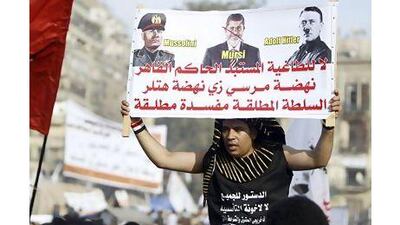The British government’s decision to support the formation of the Muslim Brotherhood’s government in Egypt in 2012 has led to London now facing a dilemma over how it deals with the Islamist movement.
On one level, a number of senior UK officials still view the Brotherhood as a benign organisation that, given a fair wind, could form a moderate government based on Islamic values.
But there is also a considerable body of sceptics at the heart of Whitehall’s security and intelligence establishment who take a more jaundiced view of the Brotherhood. At best, they see it as an organisation that supports the more radical streams of Islamist ideology that lie behind the recent terrorist attacks in London and Manchester. At worst, they see it as a point of entry for impressionable young people to become active converts to terrorism.
Qatar’s continued support for the Muslim Brotherhood lies at the heart of the diplomatic rift between Doha and the quartet of Arab states. Britain’s ambivalent position towards the the Brotherhood has the potential to cause friction between London and its long-standing allies in the Gulf.
The dispute over Britain’s ambiguous attitude towards the Brotherhood dates back to the Arab uprisings in 2011, when David Cameron, then Britain's prime minister, took the decision to back the overthrow of Egyptian president Hosni Mubarak, who had been a loyal ally of Britain and the West for three decades. Mr Cameron, in common with many other western leaders, was hood-winked by the protests in Cairo’s Tahrir Square into believing Mr Mubarak’s removal from power would lead to a more accountable and democratic system of government.
Instead, it led to the Muslim Brotherhood seizing power and implementing a brutal regime, which saw thousands of innocent civilians killed and injured as it sought to implement its uncompromising Islamist agenda.
I was personally made aware of the naivety of the British government’s approach towards the Brotherhood at a subsequent meeting with Mr Cameron, during which he told me that, as Egypt was predominantly a Muslim country, he thought it was about time it had a Muslim government.
This was certainly not the view held by many of Britain’s close allies in the region, and Saudi and the UAE in particular complained that Britain had allowed the Brotherhood to establish a base in London from which, after its success in forming a government in Egypt, it sought to spread its toxic ideology further afield.
Since the overthrow of Egypt’s Muslim Brotherhood government, the country, led by Abdel Fattah El Sisi, has joined its Arab allies in outlawing the Brotherhood and accusing it of links to terrorism. The Muslim Brotherhood denies this, saying it is a peaceful political movement.
Now the dispute between the quartet of Arab states and Qatar has yet again raised questions about Britain’s future relationship with the Brotherhood, with many senior Gulf diplomats actively lobbying Britain's foreign office to formally denounce the movement as a terrorist organisation, and close down its activities in London.
Many senior security officials in London now concede that the British government needs to reappraise its position towards the Brotherhood.
The last time Britain examined the issue was when Sir John Jenkins, a former UK ambassador to Saudi Arabia, headed an inquiry into the Brotherhood. But his report, which was published in 2015, was inconclusive, and said it found no direct links between the Brotherhood and radical Islam, even though it conceded that membership of the Brotherhood could be considered a “possible indicator of extremism”, and that the group had been a “rite of passage” for some members.
But a great deal more evidence has now become available concerning the Brotherhood’s links with Islamist terror groups, such as Hamas and Hizbollah, which are both deemed to be terror organisations by Britain.
A detailed report, called The Muslim Brotherhood: A Failure in Political Evolution, published this week by Dr Nawaf Obaid, a visiting fellow at Harvard's highly-respected Belfer Centre for Science and International Affairs, also highlights the Brotherhood's support for Islamist-inspired terrorism. In a damning summary of the movement's activities, Dr Obaid denounces the Brotherhood as "an oppositionist movement that does not represent a sustainable form of governance, offers little in the way of social or economic programmes, and some of its members have carried out and supported political violence and jihadist terror."
If these are the type of conclusions that experts in the region are reaching about the Brotherhood, then the time has definitely come for the British government to fully evaluate the threat the Muslim Brotherhood poses to the stability both of the Arab world and its allies.
Con Coughlin is the Telegraph’s Defence and Foreign Affairs Editor


